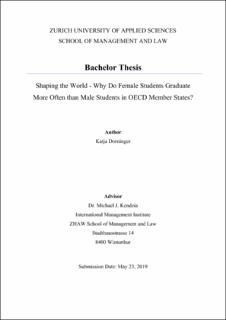Please use this identifier to cite or link to this item:
https://doi.org/10.21256/zhaw-18962| Publication type: | Bachelor thesis |
| Title: | Shaping the world : why do female students graduate more often than male students in OECD member states? |
| Authors: | Dorninger, Katja |
| Advisors / Reviewers: | Kendzia, Michael Jan |
| DOI: | 10.21256/zhaw-18962 |
| Extent: | 39 |
| Issue Date: | 2019 |
| Publisher / Ed. Institution: | ZHAW Zürcher Hochschule für Angewandte Wissenschaften |
| Publisher / Ed. Institution: | Winterthur |
| Language: | English |
| Subject (DDC): | 378: Higher education |
| Abstract: | Across OECD countries, girls and young women often outperform their peers in educational attainment, and in testing achievements in almost all educational levels. This bachelor thesis investigates driving forces behind the phenomenon including variation between OECD member states and field of study. Since the issue of gender equality has arisen, the phenomenon of gender gaps in general has become increasingly relevant. Gender gaps in education and income are strong indicators for equality in a country’s society, which in turn delivers greater growth and inclusiveness. Although there are already several empirical studies about the growing gender gap in education in OECD member states as well as in other countries around the globe, it has been little empirical research done about the driving forces behind the phenomenon. The findings of this current thesis are in line with the few existing approaches. Mostly external, societal and economic factors were found to be driving forces behind the reversal of the gender gap in education and any variation across OECD countries. Whereas the interaction of external and internal factors explains why there is any female educational advantage possible at all. Against all odds, performance was not found to be responsible for gender variation in the field of study, rather motivation accounts for a bulk of gender differences in certain specialties. |
| URI: | https://digitalcollection.zhaw.ch/handle/11475/18962 |
| License (according to publishing contract): | CC BY-NC-ND 4.0: Attribution - Non commercial - No derivatives 4.0 International |
| Departement: | School of Management and Law |
| Appears in collections: | BSc Betriebsökonomie |
Files in This Item:
| File | Description | Size | Format | |
|---|---|---|---|---|
| Dorninger_Katja_Shaping_the_World_Bachelorthesis.pdf | 2.76 MB | Adobe PDF |  View/Open |
Show full item record
Dorninger, K. (2019). Shaping the world : why do female students graduate more often than male students in OECD member states? [Bachelor’s thesis, ZHAW Zürcher Hochschule für Angewandte Wissenschaften]. https://doi.org/10.21256/zhaw-18962
Dorninger, K. (2019) Shaping the world : why do female students graduate more often than male students in OECD member states? Bachelor’s thesis. ZHAW Zürcher Hochschule für Angewandte Wissenschaften. Available at: https://doi.org/10.21256/zhaw-18962.
K. Dorninger, “Shaping the world : why do female students graduate more often than male students in OECD member states?,” Bachelor’s thesis, ZHAW Zürcher Hochschule für Angewandte Wissenschaften, Winterthur, 2019. doi: 10.21256/zhaw-18962.
DORNINGER, Katja, 2019. Shaping the world : why do female students graduate more often than male students in OECD member states? Bachelor’s thesis. Winterthur: ZHAW Zürcher Hochschule für Angewandte Wissenschaften
Dorninger, Katja. 2019. “Shaping the World : Why Do Female Students Graduate More Often than Male Students in OECD Member States?” Bachelor’s thesis, Winterthur: ZHAW Zürcher Hochschule für Angewandte Wissenschaften. https://doi.org/10.21256/zhaw-18962.
Dorninger, Katja. Shaping the World : Why Do Female Students Graduate More Often than Male Students in OECD Member States? ZHAW Zürcher Hochschule für Angewandte Wissenschaften, 2019, https://doi.org/10.21256/zhaw-18962.
Items in DSpace are protected by copyright, with all rights reserved, unless otherwise indicated.